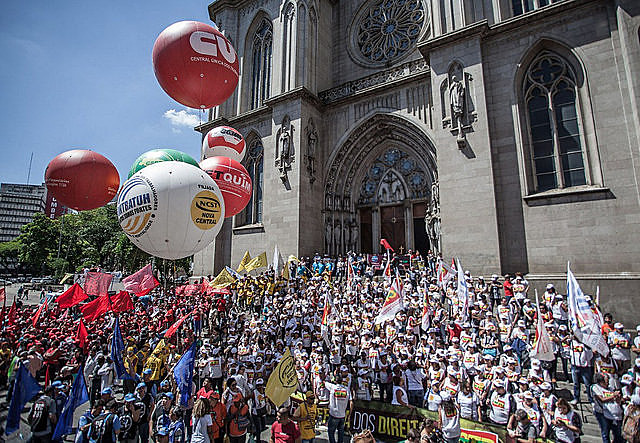Thousands of Brazilian workers took to the streets on Friday to protest controversial changes to the country’s labor laws, which critics fear will undermine collective bargaining agreements, reduce the power of unions and weaken job security for Brazilian workers.
The political mobilizations, which includes the participation of Brazil’s largest labor federation, the Unified Workers Central (CUT), are staging mass protests in 24 capital cities, rejecting the new labor law, which enters into effect on Saturday.
In São Paulo, Brazil’s largest city, an estimated 20,000 people gathered in order to protest the highly unpopular labor laws.
"We believe that the new labor law is politically motivated and fundamentally seeks to undermine and neutralize the role of unions,” the Vice President of CUT Carmen Foro told Brasil de Fato.
The Brazilian labor leader went on to add that the new law would grant more power to employers to negotiate individually with workers rather than collectively through unions.
“Unions play an essential role guaranteeing worker rights. Without the role of unions there will always be unbalanced and asymmetrical power dynamic between workers and employees,” Foro stated.
Brazil’s Congress debated the law without the participation of CUT or any trade union opposed to its provisions, which the International Labor Organization (ILO) argued represented a violation of international labor conventions signed by Brazil.
Meanwhile, one of the most significant changes is the removal of restrictions on outsourcing and the elimination of workers rights including provisions on vacations, overtime and working hours. The bill could also delay Christmas bonuses, eliminate transportation to worksites and scrap meal voucher programs for outsourced workers.
In her interview with Brasil de Fato, Foro went on to warn that the new labor law will reverse 15 years of positive gains in the labor sector.
Her statements coincide with a recent report carried out by the ILO, which found that from 2004 to 2014, Brazil experienced a strengthening of collective bargaining, which ensured that an average of over 90% of collective agreements produced wage adjustments above inflation. Meanwhile, during that same period, 20 million new formal jobs were generated, raising the formal employment rate from 46.7% to 59.3%.
National protest
Bahia, Paraíba, Distrito Federal, Maranhão, Alagoas, Pernambuco, and Ceará are some of the states that today are participating in the Day of Struggle against Labor and Pension Reforms as of this morning November 10.
In Maceió, capital of Alagoas, the stoppage is at the entrance of Braskem (petrochemical company) and in the march in the center of the city there were more than five thousand people. In Salvador, Bahia, the highways were blocked to the Lapa station. In Fortaleza, 20 thousand workers concentrated in the Bandeira Plaza. In São Luiz, Maranhão, indigenous people, landless people, quilombo communities and urban workers are participating in the mobilization.
In the Federal District, the demonstrators are confident in people’s power in the streets. Victor Frota da Silva, director of the Urban Trade Union of the Federal District, talks about the labor reform as a regression of years of workers struggle: “The Temer government did this labor reform. More than a reform, it is taking away the rights of the people that were won after many decades of struggle like in the case of the CLL.” He also believes that it is still possible to stop the Pension reform with the election of a people’s candidate in 2018.
Aristides Veras, President of the National Confederation of Agricultural Workers -Contag-, states that the effects of the labor reform in the countryside will be even more devastating than in the cities. “The consequences will cause an increase in slave labor, an increase in violence in the countryside, increased precarity of work, decrease of income of workers and increase of conflicts,” he said.
Paraná, Rio de Janeiro, Pará, Minas Gerais and Rio Grande do Norte are also organizing in the streets with the central trade unions.
In social media, the hashtag #derrubareforma (down with the reform) is trending today.




